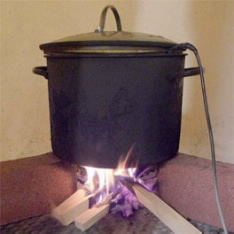FOR IMMEDIATE RELEASE
ACS News Service Weekly PressPac: March 27, 2013
Ultrafine particles raise concerns about improved cookstoves
“Characterization of Ultrafine Particulate Matter from Traditional and Improved Biomass Cookstoves”
Environmental Science & Technology
A new study raises concerns about possible health impacts of very small particles of soot released from the “improved cookstoves” that international aid agencies are promoting to replace open-fire cooking in developing countries. It appears in the ACS journal Environmental Science & Technology.
Brian Just and colleagues point out that 3 billion people worldwide still cook meals on stoves or open fires that burn wood, animal dung or other biomass fuel. These fires, which sometimes are indoors, release air pollutants linked to 3.5 million deaths annually. Soot, or so-called “black carbon" (BC), released in the smoke also is a factor in global warming. In an effort to remedy the situation, aid agencies plan the distribution of 100 million new, clean-burning cookstoves during the next 10 years. Concerns have arisen, however, about pollutants released by the stoves. Just’s team focused on emissions of ultrafine soot particles linked to some of the most serious health problems.
They describe laboratory tests comparing two styles of improved cookstoves to a traditional three-stone open fire burning wood. Improved stoves did release much lower overall levels of soot. However, per quantity of fuel burned, they did not emit significantly smaller amounts of BC, and they produced three times the quantity of worrisome ultrafine particles that can penetrate deep into the lungs compared to the open fire. The tests included only a narrow range of operating conditions, but for these conditions, at least, it appears that new cookstoves are not automatic "fixes" to the health problems associated with cooking activities and that, “Given improved cookstoves’ recent funding and attention, continued improvement in our understanding of emissions and end effects is important,” they say.
The authors acknowledge funding from the Natural Sciences and Engineering Research Council of Canada (NSERC) under the Collaborative Research and Training Experience (CREATE) Atmospheric Aerosol Program.
![]()
Contact
Science Inquiries: Michael Woods, Editor, 202-872-6293
General Inquiries: Michael Bernstein, 202-872-6042

open-fire cooking in developing countries
with “improved cookstoves,” but a study
raises concerns for possible health
impacts of very small particles of soot
from the new models.

